Sunday, March 8, 2015
Civilization V
Bismark appears before me, shoulders up, hands behind his back. Lights pours in through the windows in the matte painting backdrop which, confusingly, has some embedded DirectX elements, such as the oil lamp on his desk. He addresses me in German. I can't speak German. Fortunately, there are subtitles.
He wants to know if I am interested in renewing an agreement for open borders. His civilization and mine are on separate continents, and he doesn't get out much because of all the wars he and the Greeks and the Americans have going on amongst themselves, but I always renew the agreement anyway. He gestures with his right hand while continuing to speak a language I don't know, as if to emphasize just how open these borders will be. He is pleased when I accept.
It is 77 B.C. I am Queen Elizabeth I, and half the world answers to my will. All Civilization games are turn-based, with the turns across the eras representing shorter and shorter increments of time. In a normal-speed game a player will blow through the B.C.s in the first hour or so of gameplay, but I've installed a mod that starts the play earlier and slower in a prehistoric age not found in the base game. Because of this I am now researching radio, and will probably have rockets by the time Jesus is born.
Washington calls up, wondering if I want to do another research agreement. Washington speaks English, which is nice, but the game designers elected to give him a southern accent. This is not unreasonable - he is from Virginia, after all - but it's somehow persistently unsettling. It's probably because he sounds almost exactly like Bill Clinton, except more awkward. We conclude business with an "Alright" on his part, and he makes a small motion with his right hand, as if to indicate a door just off-screen. He has been wearing the same clothes for almost five thousand years.
Behold the majesty of the English Empire, so vast it can't all be simultaneously displayed on this ridiculous 5:4 monitor I bought from work.
My civilization began on the shores of the larger of the game's two randomly generated continents. I shared it with two other great powers: the French, led by Napoleon, and the Ottomans, led by Suleiman. Both of them attacked me early in the game, when warfare was decided by the prehistory mod's cave-dwelling combat units. I eventually sued for peace in both wars but never forgot the slight, and went back later with bigger men and sharper sticks. I took control of both fledgling empires so fast that it took me centuries to fill in the gaps between cities on the map.
Time has been good to England. I have drained the vast swamps that once lay inland from London and subdued the last of the remarkably persistent barbarians, who spawn on tiles outside a player's line of sight. A fleet of workers have done such an unnervingly thorough job of improving the terrain tiles that when a new technology reveals a new resource - coal or oil or aluminum - it often pops up beneath an unrelated tile improvement, which must then be torn down to get at the resource.
Civilization V uses a hexagonal grid base, unlike the previous four games, which all used squares. This makes the various features superimposed on the grid look a little more natural - the way rivers flow, for instance - but it also makes planning things like road layout or troop movements slightly more counterintuitive. The latter problem is compounded by the fact that most units can no longer stack (as they could in earlier Civ games), and I've had armies tripping over themselves on the way to crush a foe.
There's a spot of oil I can't get at because it's underneath a Landmark. I don't want to destroy the Landmark because they can only be created by Great Artists, a class of Great People who only appear in cities occasionally. Great People are consumed when used to create a tile improvement, and they're also the only units in the game to receive proper names. In this case I think Duke Ellington might have died to make this monument happen, and I don't want to destroy his legacy.
I call up my advisors, who occupy info boxes adjacent to one another, like the Hollywood Squares. The Foreign Advisor, a woman with a Mediterranean complexion and a dress with a fold attached to her left wrist, tells me I need to bolster our alliance with Monaco. Monaco is one of a number of city-states, small powers new to Civilization V. They ally themselves with the greater empires and will go to war alongside them if sufficiently motivated. The British continent holds five such states, of which I am allied with three. Destroying them is an option, but so is paying them to stay on their good side, and picking a fight with somebody that small makes me feel bad. They don't even have visible leaders who pop up when I negotiate with them.
The Military Advisor, who occupies the square one up and to the right of the Foreign Advisor, is a bearded Caucasian man who seems loosely modeled on Ulysses S. Grant. He points out that the Germans don't have much of an army, something I saw firsthand when I sent a unit to explore that continent's interior. Conquering the world is absolutely an option in Civilization V, but I've done so in a recent game and I don't see the entertainment in doing so again so soon. Besides, I feel really bad whenever I crush another civilization and its leader pops up, for the last time, to sadly congratulate me. Napoleon took it well enough, but Suleiman looked positively heartbroken, and I feel terrible about that. Even if he was a jerk to me. Even if it was three thousand years ago.
The Economic Advisor, in the top-right quadrant, informs me that we are making money. She is a Caucasian woman presently dressed like a cross between Scarlett O'Hara and Princess Peach; their outfits all vary depending on what era I'm in. The Economic Advisor's functions are substantially simpler than those of her direct ancestor, the Domestic Advisor from Civilization III, who also handled city happiness and productivity. Those functions still exist, but are now assigned to a menu for each city.
Truthfully, although different social structure options exist, the game is totalitarian and autocratic. The president of the United States - or the queen of England, for that matter - can't really tell a certain town to build a granary, but Stalin could have. If this game is any indication, being Stalin should have been a blast, but there he was, killing half the Soviet Union to make an example to the other half. Some people just don't know how to have fun, and unfortunately a disproportionate number of them become world leaders.
The last of my four advisors, the Science Advisor, a black man with trim spectacles, informs me that York could use a library. As God-Stalin, I - and only I - can make one happen.
With world domination off the table, a few options exist for me to beat the game. I can win the Space Race, which is done by completing the Apollo Project - a National Wonder - and then building the necessary spaceship parts to colonize a new world. This was my preferred way to win in Civilization IV, the Civ game perhaps best remembered as the one where Leonard Nimoy read quotes whenever you unlocked a technology.
There's also a Cultural Victory. In Civilization V, this means completing five policy branches and then building something called the Utopia Project. I've never done this before, but I'm going for it now. With an entire continent to myself and military worries long allayed, I build cultural building after cultural building across the empire, museums and opera houses and temples. I've snagged a few World Wonders as well. These actually appear on the terrain, albeit in tiny form. The game does a pretty good job integrating them into the grid tiles, but for some reason when I finished Stonehenge it appeared several miles out at sea. I'll have to make sure not to hit it with one of my many, many boats.
For the hell of it, I pull up the menu for York and then the purchase screen. A library would be 400 gold. The Economic Advisor is correct, though; the empire is rich. I purchase the library and go back to the advisors. The Science Advisor now tells me that a university would be a wise investment. I return to my duties, and wait for Bismark or Washington to call again.
Subscribe to:
Post Comments (Atom)

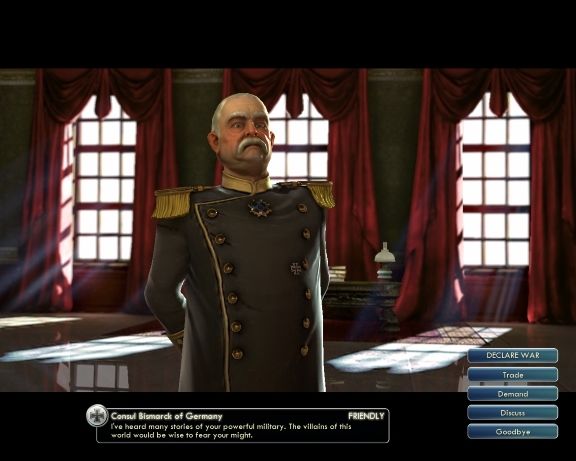
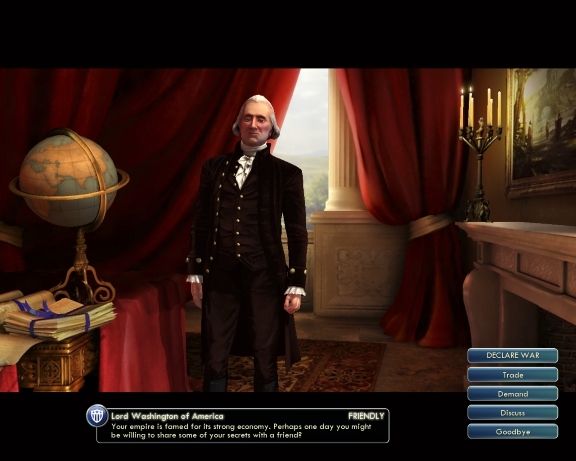
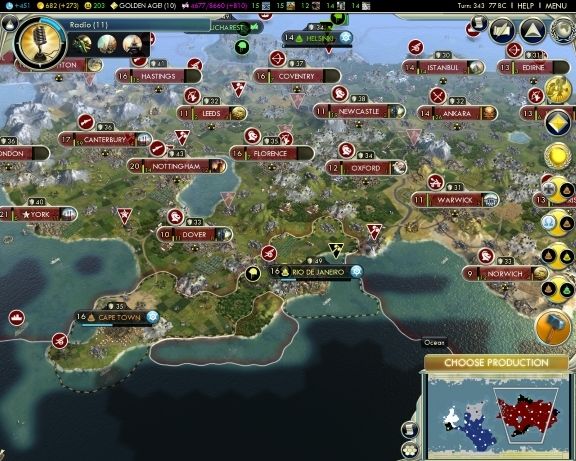
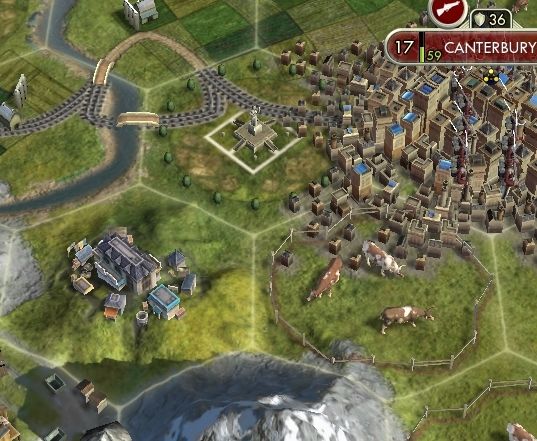
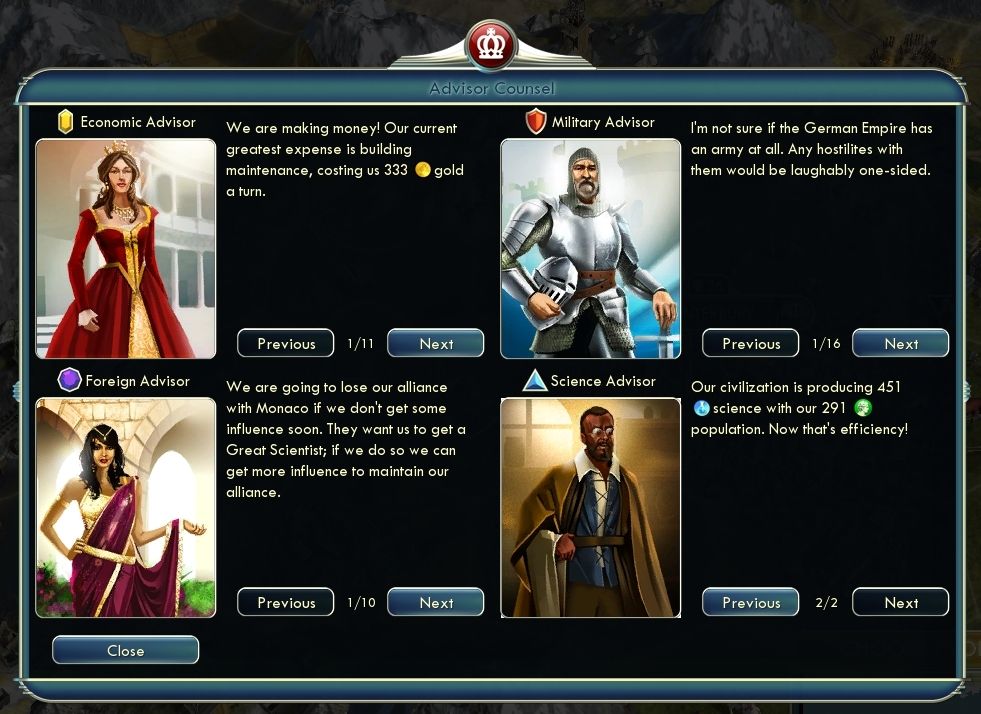
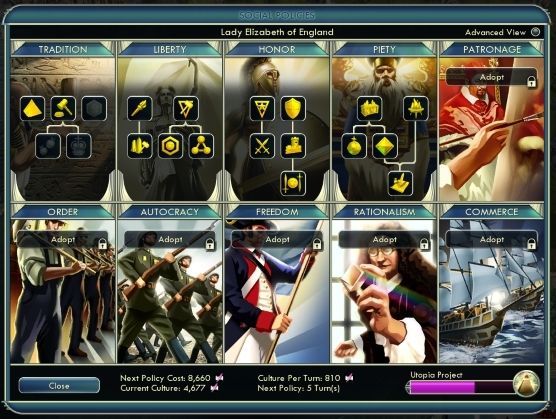
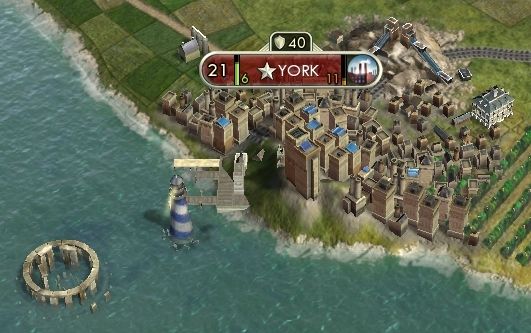
No comments:
Post a Comment